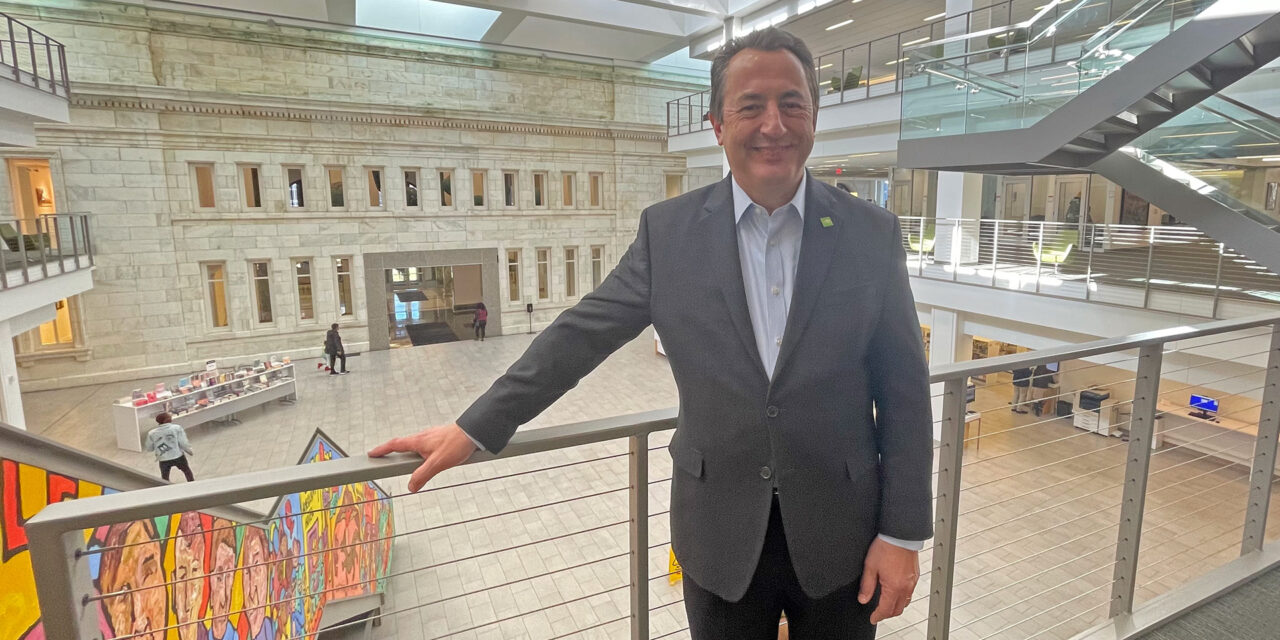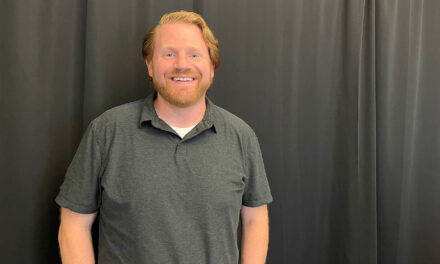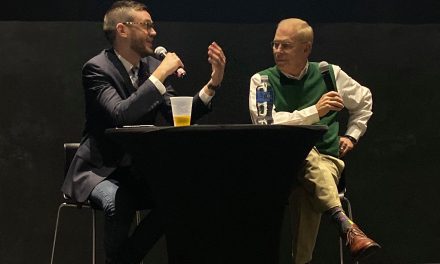Podcast: Play in new window | Download
Subscribe: RSS
moment. But what change Have you seen over that time? And what sort of initiatives are you proud of? Having overseen?
Patrick Losinski 06:35
Yeah, so I think a couple of things would would certainly stand out to us, absolutely very visible to our community that we’ve been on an aggressive capital improvement campaign that really started in 2013. So we’ve been at this 10 years. And we’re in the process of working on our 16th project through that period of time. So, you know, there’s just an extraordinary amount of activity in the community that I think has really upgraded the libraries. But, you know, maybe especially since I’ve been we’re in our 100 and 50th. Year, you also have to have a real appreciation for it wasn’t that long ago, it was 1986 to 1990 91, we redid the whole main library. So there was a whole generation of activity and built many of the regional libraries in the suburbs, you know, that happened through the 80s and 90s, as well. But the point is Columbus and Franklin County continues to grow. The demands for library service have continued to grow and be strong. And so it’s it’s really appreciation what sort of each generation of library teams have done to make this such a great system throughout. But you know, certainly in 20 years, that’s one thing I would I would point to, we had a sometimes people forget this because we’re not on the ballot very often. But last time we were on the ballot was 2010. And you think about that coming right after the Great Recession, and the loving was expiring. So we didn’t have a choice. And you know, the community at a time when money was particularly tight. The community supported us by a two to one margin, we lost two precincts in the whole county. So I think having that level of support from the community has enabled us to do these things. So I think that’s important. But along with that, Tim is a feeling that I remember how ecstatic we were the night of the election when we knew we had won by such a large margin. And yet you go home and you say while at a time when resources are so tight. This community says we need to continue to invest in the library. And so, you know, we had, we have job help centers. And you know, I think we were so responsive to the needs of the community at that time that I just think it’s the it’s the hallmark of the Columbus Metropolitan Library of there are many libraries that have not yet and are really opposed to the notion that their user base are referred to as customers, most libraries, many libraries refer to them as patrons. But Larry Black, who is the library director, for me started this whole notion of a strong customer service ethic. And I think you see that every day in our buildings, our it’s part of our culture, our people believe in it. They work hard at perfecting it. And there’s such a strong service ethic among our workforce. And I hear about that all the time. And I I’m just so proud of our employees. So I think we’ve kept that up as well. I would say the the work that we’ve done to try to really ramp up our presence in the out of school time space has been significant. Can
Tim Fulton 10:18
you talk about that? And what that what that means? Yeah,
Patrick Losinski 10:20
we tried as a pilot in 2003, when we were opening the new Linden branch, we put in a very small Homework Help Center. Well, there’s a Homework Help Center in every location today. Well, we moved to school help center, because that’s helping whatever level you are in school. And, you know, that’s that six figure numbers of kids who come in every year to register for that level of service. And its schools can only do so much during 730 or eight in the morning until 230, or 330. So we’re going to try to be strong players in the preschool arena, after school weekends, and summers. And I think we’ve really ramped up our game there. This is a little bit behind the scenes for many people. But every month we deliver a bin of books to 400 classrooms in Franklin County, to elementary as a way of supporting the recreational needs of students, whether they’re in a public school or charter school, they both they are constituents of the Columbus Metropolitan Library, they just happen to be in the school for a part of the day. So we want to make sure we’re there to serve them as best we can. I also think that it’s not just the Columbus library, I think the library profession as a whole has done a great job of continuing to evolve, transition, be resilient, be relevant 15 years ago, we’re not talking about ebooks. I know, we just be here. And we have over 5 million circulations of ebooks that people are downloading from their home. I actually started in this business before the internet was, you know, a common utility in a public library to see what we’ve added in that space. And then we’ve moved to wireless. I think libraries have just continued sometimes to lead, but always to be no more than a quarter step behind what our public expectations are. And I think that’s really led to our continued success and appreciation and support in the community.
Tim Fulton 12:39
Can you talk a little bit about your background and how you got here, you talked about the different systems you had worked in? I think some people are unfamiliar, you have a master’s degree, I assume it’s in library science. That’s how you become a library and talk a little bit about your career path. And what brings you to Central Ohio.
Patrick Losinski 12:59
What I think I’ve told the story many times over the years, Tim, but I’m a it’s almost a little bit of an accident that I’m a librarian and then a library director, I was maybe professionally more aligned with what you do for a living because I was a communications major, but with an emphasis in television and film. During my undergraduate degree. I had a year long internship for a cable television access station, you kind of know what that is where you see, like channel three or two where it’s the city’s public channel and you see ribbon cuttings at the, you know, the new civic building and government meetings and things like that. Well actually did that as a college intern. But that was in the analog world before digital, so we would horse the big cameras and switchers. We would go to city council meetings, county commissioner meetings and the in person studio happened to be in the public library. And so for a year, I kind of watched that go on and and I thought well, I’ve I had always used libraries. At one day as probably a 20 or 21 year old I worked up the nerve to ask for an appointment to meet with the library director. This wasn’t a big library. It was in a town of 20 25,000 people and got it. I really I started by asking him, how did you become a library director because it looks interesting. And you know, I had all kinds of notions that maybe I was going to go to law school, I was accepted to a master’s degree in Strategic Communications at the University of Wisconsin. And like six or eight weeks before it started, I had always had this library thing in the back of my mind. And I applied to the school and I looked at everything and I said, I think I could maybe someday be a library too. After and so I went into the program had been having never really done library work. And, you know, like, got my first library job at a small town, Oshkosh, Wisconsin, and worked in circulation. And from there, you know, had successively larger libraries that I was the director. I know, the first one was in Port Clinton, Ohio, interestingly, and the I think it had 13 staff. And the only reason I got that job was the first two candidates said no. And so anyway, from there just led to some larger libraries. You know, Columbus was always known as fourth reputation as a great library system. And so it was an honor to be recruited, you know, like many who come to Columbus, at first you think, Well, I’m not leaving Colorado, to go to Columbus, Ohio, and then coming out and seeing the library and meeting the staff, and meeting the Board of Trustees who were just so impressive in terms of the importance that they placed on the library, I knew pretty quickly that not only was I interested, I really wanted the job, and it has not disappointed
Tim Fulton 16:15
when it’s important to have that kind of support. Right? Can you step back a little bit and talk about your governance structure, and then also your funding? Because it’s coming from a couple of different places, right, not just state funding?
Patrick Losinski 16:30
Yeah. So. So there’s a library board of trustees, seven members, and they serve seven year terms. So one is up each year. And so there’s some continuity that comes from that process. And they have the, they’re the fiduciary board, if you will, so they have responsibility for hiring the CEO, approving the budget and proving the major program of service, handling all the functions around auditing finance, were audited by the state auditor of Ohio, because we’re political subdivision in the Ohio Revised Code. And their duties are all outlined in the Ohio Revised Code. And then in addition to that, we have a we are supported by a separate entity called the Columbus Metropolitan Library Foundation. And that’s a 501 C three whose sole responsibility is to raise private money to non tax money to support the library. And I can tell you, since about 2012 2013, they’ve raised almost $40 million, and to put into sort of real life terms for our community without their help, we probably have three fewer new branches. So that’s the Okay, that they’ve had. And then we also have a really important group that’s been along a long time, thinking there, it’s coming close to 40 years. It’s our friends of the library. And that is a group that organizes the volunteer activities. They handle annual book sales of material that we’re withdrawing or have received as a donations, they leased the space for the library cafes, we have a couple of those, we have a gift store at the main library, and their proceeds to go in to support the library. And so you know, all of that makes for some complexity and a lot of meetings. But, but a lot of people who and that’s when you get the appreciation for, man, there’s a lot of people who want to step up and serve and who really love this institution, I can tell you in my 21st year, that’s just incredibly inspiring every time like, take a moment to think about
Tim Fulton 18:53
and when you talked about the capital campaign that you guys, it’s semi ongoing. Is that fair? The capital campaign?
Patrick Losinski 19:02
Well, fundraising is ongoing. And then, you know, the last effort we had was a comprehensive campaign. Because what you I think, 15 to 20 years ago, a lot of institutions did a capital campaign, because you’re going to raise money for bricks and mortar. And what I now with many donors is some say, Well, I want to support the programming for the staff, or I want to support the technology for the staff. So by taking an approach where we call it a comprehensive campaign, that kind of gives a menu of options and it strengthens your ability to raise funds when you have options for donors.
Tim Fulton 19:47
Got it, but that is happening through the foundation. Primarily. Correct. Got it. Let’s talk about what the library experienced during the pandemic and how you guys continue to offer services. And what is the new normal as a result of that, like, what are the services that will, will stay and some of the things that you were able to revert back to normal?
Patrick Losinski 20:08
Yeah, and I think some of this is, is really obvious. And some of it is still very new nuance that I think your listeners will say, Oh, I didn’t think of that aspect. Right. Prior to the I mean, everyone knows we, you check out material, right. But there’s probably a large constituency of ours percentage of our constituency that doesn’t realize that many people rely on coming into the library, to use fax machines, because fax machines are the only way that many benefit programs will accept applications. So we do have a booming business, in fact, service, you say, Well, what about Don’t people scan? A some agencies don’t accept the scan, still, and be people don’t have scanners. And so they’re coming in to use that technology. One of the things I did, I would say within a week was I called Doug Kreidler, from the Columbus Foundation. And I said, Doug, we whether or not you’ve thought about this lately, but we probably have somewhere around 1.8 million reservations a year to use computing time. We are the biggest public computing utility by far in the county. By fine, we’re gonna shut our doors, what’s going to happen to the people to stay connected with an expectation that the teachers are going to teach remotely and reach kids and parents may not have broadband may not have the devices may not have the inclination, or the technical assistance? And again, for many people who say, Well, everyone has that? No, they actually don’t a large number do not. So one of the things I’m most proud of during the that happened during the pandemic was working with warp See, working with the Columbus Foundation, and then more and more came on the city of Columbus, Columbus City Schools, we formed the Franklin County digital equity Coalition, which is a live entity today that has moved over now to smart Columbus. But for two years, I facilitated the meetings of nonprofits throughout Franklin County to really get to the root of this problem. And to understand this was not just a library issue, where do unhoused people go to get access to the internet, low income housing and others. So remember, the YWCA and others. So it was, suddenly there’s this large coalition of people working on this effort. And I think we understand that public policy issues so much better than we did before the pandemic. And there’s so much better awareness. I mean, we were able to install services that we we had wireless and all of our parking lots, right? That was something so that people can come in and describe this. I think the term was coined after Hurricane Katrina, when they said public libraries had blue screen parking lots because people were coming in to fill out their FEMA forms. The library still, rarely so they could do that. And I think some of that, you know, was really transpiring that led to buying Chromebooks for kids. And it led to a partnership with an agency called PCs for people, which recondition used machine. You know, all of that happened with the library’s leadership, but with many other partners, but my point is, pandemic made that happen. And now we’re on the path to really seriously address the fact that we may have 40,000 households in the county, without broadband. And in today’s world, that’s the fourth utility after electricity, gas and water. Right. So I think that happened, I think we had an advantage over some cultural institutions in that while we had a strong electronic presence, and we could push more to the E environment. There’s still so many people who prefer a book over a digital book, we have an internal or public strategy called My Library, which is really about how we say it results in a library working for me in quotations. And what that means is we’ve got to be where individuals want to be the library I grew up with. It had 10 Simple Rules, and you either follow them or you didn’t use the library. Well, today’s library is what’s your mobile app? Oh, we can do storytime on FaceTime. You know, publishers worked with us they suspended the copyrights so that we could do those kinds of programs for the community. But at the end of the day, the curbside service of people coming up, and still being able to get a bag of books or whatever, our staff felt incredibly helpful and useful. And I don’t know that there was a time that the community ever felt more grateful and expressed their gratitude to us. So you know, those are all the things that happened. And you, you look back to him, the, you know, those first four months, what we thought COVID could be and the, we’re wiping down our groceries and everything else, to you know, the fact now we understand it’s something we have to live with, you know, what one quick thing I would point out is, again, within the first couple of weeks, we can’t get, we have a relationship with Patel, who’s such a great philanthropic partner to so many. But we knew they had the laboratories, and we actually called them we called the Institute for Museum and Library Services in DC. And we said, here’s the thing about libraries, our materials come back, what do we do with it comes back to protect our people, or the people who might use those. So this was a major, we had major funding from foundations and others Institute for Museum and Library Service, Patel did a national study on the presence of the virus as materials were coming back. And that served worldwide libraries, Library of Congress, the Smithsonian Institution, we’re all part of the advisory committee with us trying to study this issue. And today, we know it’s airborne, it’s not going to survive. But in those early months, none of us knew any of that. And it was it was a little bit of a panic situation for many. And I think we had a level head and we’re moving forward, and sort of showing the leadership of the Columbus Metropolitan Library on a world stage. And that was also something I’m really proud of, during the pandemic.
Tim Fulton 27:09
Absolutely well, and I want to commend you for as somebody who had a five year old at the beginning of it, being aware of the resources, even though I may not need some of them being aware of the resources available, and the communication that you guys were doing around that to make sure people knew. So kudos for that. I appreciate that. Talk a little bit about, are there things that you view as because you’re an advocate, right, you’re in a you’re in a you do have a day to day job, but you are in a public position? Are there sort of threats to the library, you’ve got your funding? It’s okay. i There’s a lot of talk about maybe not in your space, but around the banning of books, or the restricting of material from folks. I wonder how much of that you. You may hear about it, but is it affecting our system?
Patrick Losinski 28:07
Yeah, well, we could probably spend the whole podcast on just this topic, Tim, you know, one, I’ve been around long enough. I’m in my 40th year of working in libraries, that’s unbelievable. That even comes out of my mouth. But, you know, I, I, I remember sort of the 1980s. And, you know, there was a real push of Jerry Falwell at that time was leading the effort to ban materials and libraries. People don’t necessarily remember this, but Tipper Gore, Al Gore’s wife being an effort around videos and explicit lyrics and music. And so you have to try to take some time, at first to to understand what the intent is of people. And I think, you know, it’s easy to say, well, these are booked banners, and there’s just something wrong, you know, it’s okay, they see a problem. And they have a level of concern. We’ve always operated and I think most libraries do under the idea that we respect the right of every parent to guide their child’s reading, listening, viewing in whatever they believe is appropriate. It’s just not a right, that extends your value system to all the other parents and children in a particular community. And, you know, this is we have to remind people of those principles from time to time. And to say that, well, intellectual freedom is a really easy concept to grasp when you agree. Right. But and, you know, there’s, there’s another line, a line that we use in libraries is that we pretty much had something to offend everyone. And, you know, I know that sounds just kind of tongue in cheek. But it’s really true to say, Well, I think it’s a pourraient. What Adolf Hitler wrote in mind come. But that’s a common book that you find in libraries, is at the core and is at the Bible, what people might object to the whole point, or that space where people are free to come in and explore their curiosities and their interests and to learn and to accept or reject or refute or do whatever they want. I don’t know who said this, but I should, because I use this quote so often, but instead of public libraries are democracy’s Best Kept promise. And I really I, you know, the longer I’m in this business, the more I embrace that idea, and and, you know, recognize the responsibility that comes with that maybe at a time when everything is so partisan, you think, can that possibly happen. And yet, I invite anyone to come into your library, and take a look at all of the people who are coexisting peacefully in the library. And if society was working, as well, as it does within a public library, we’d all be in a better place. And that to say, we don’t have issues from time to time we do clearly. You know, so So I think it’s education, you know, back to your original question, it just has to be an education process where we talk to folks about, I understand you object to that item. Understand that you don’t want to read it, you don’t want your child to read it. But you can’t extend that belief to others and have and remove something because it is in your eyes harmful to others. That’s, that’s not going to work for us.
Tim Fulton 31:55
What are things that folks can do to support the library if they want to beyond being a customer? I assume volunteering, donating, but are there things that folks may not think of when they think of how can I support my local library system?
Patrick Losinski 32:13
Well, then the all the things that you just mentioned, in terms of use in terms of volunteer, we have those, you know, that we kind of have to suspend that for a while during COVID. But that’s coming back. Obviously, the financial donations help us to do all of those things as well. But some of it is educate yourself around library issues around book challenges right now, you know, understand, serves as a discussion point, I think right now coming out of a pandemic, we can’t just say, Oh, we’ve reset and 23 looks good. Let’s move forward. We’ve entry kids that have lost three years, this, Tim, this is going to challenge us for a generation or longer. Reading is an essential life skill. And if you don’t have it, you’re in trouble. So always, you know, we this, I’m just reporting sort of data that one of the common characteristics of the prison population is illiteracy. And so what why did that happen? Well, if you can’t read, maybe you have to try to find other ways to exist or thrive or do whatever, but you’re missing a big part of life. I never knew this. It’s how fast food drive and started moving to picture menus. So that people could order a number five, and see what it was rather than having to actually read it from a menu. So we really need to have people understand the importance of reading. We need to have them model reading and read to their children and talk about the importance of reading. That’s just not about library that’s about society. That’s about making sure people are equipped to, to function today and tomorrow’s world.
Tim Fulton 34:08
Absolutely. I wrap up every interview with the same two questions. One, what do you think Columbus is doing? Well, and to what are we not doing so well? Or what could we be better at? And this does not have to be in the purview of your role?
Patrick Losinski 34:23
Yeah, well, we’re doing library as well. So I like that. You know, I think there’s this is one of the early impressions and we still have it today, Tim, and that is having worked in other cities, I have a basis of comparison. What I was struck when I moved here about how open the city really is two people who come in, I had to fight in other communities to get a seat at the table. Here I was invited early on to be at that table. So I think there’s no should have, you know, were a Columbus Foundation, whether or not they still use this but the smart open community, I think that’s real. I think that’s in our genes, you know, efforts, like the big table, where we get the community together to talk about issues like that are really tremendous. I think we have good and honest government throughout, you know, are there occasional lapses? Yes. But really there, we all have to safeguard against those, but they’re the the anomaly. I think, generally, you know, the level of quality and passion of our civic leaders is really strong. And there is a strong sense of collaboration. Now, if I were to tell you what I think we need to do better. There’s too, too many, too many people being left behind. And, you know, let’s hear about the the the excitement that we have about Intel, and how catalytic that is for other businesses to move here. And a lot of people who don’t, that doesn’t even register for them to think that I can be a part of it. So let’s take the 7000 construction workers that we need, how do we get to the chronically unemployed or underemployed to say, this can be a doorway and an entry to you. And you don’t have to live in Westerville or New Albany or Worthington to be a part of that, that we really have to reach into the city and make sure that we create the honest probability of prosperity for everyone. And I think we’ve got work to do in that space. You know, we we all know how difficult the housing issues are right now. And yet a lot of work to be done. But I commend a lot of people giving a lot of effort to it. So that’s the thing that that gives me a lot of hope gives me a lot of excitement, the challenges are going to keep coming. But I just don’t think this community sort of ever runs away from a challenge or ever gives up. I think they roll up their sleeves and they get to work and folks who are perhaps not in the positions of leadership, share their opinions openly and freely. And I think that makes for a great democratic process. So I’m challenges Yes, hopeful. Absolutely.
Tim Fulton 37:31
Absolutely. Mr. Lesinski, thank you for your time today.
Patrick Losinski 37:35
I appreciate him for the opportunity. Take care.
Tim Fulton 37:48
Thank you for listening to Confluence cast presented by Columbus underground. Again, you can get more information on what we discussed today in the show notes for this episode at the confluence cast.com Please rate, subscribe, share this episode of The confluence cast with your friends, family, contacts, enemies, your favorite librarian. If you’re interested in sponsoring the confluence cast get in touch with us. We can be reached by email at info at the confluence cast.com Our theme music was composed by Ben de Robinson. Our producer is Philip Cogley. I’m your host, Tim Fulton. Have a great week.





